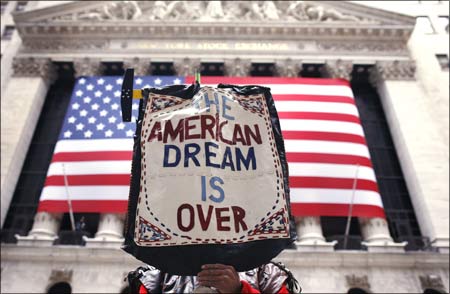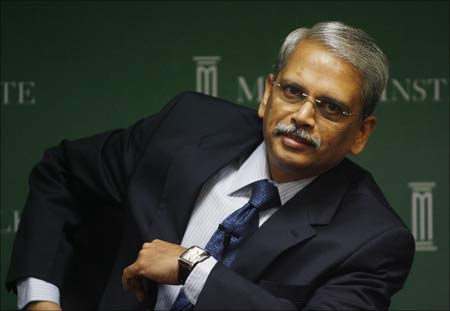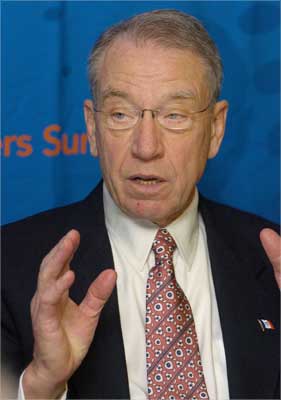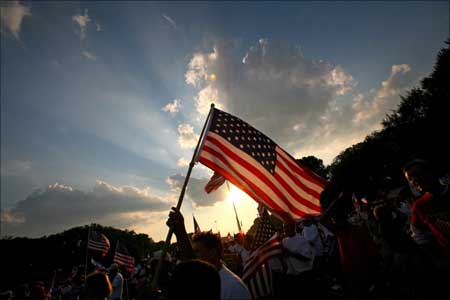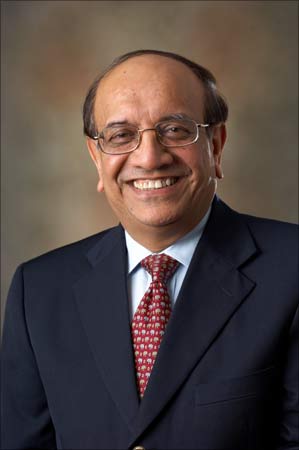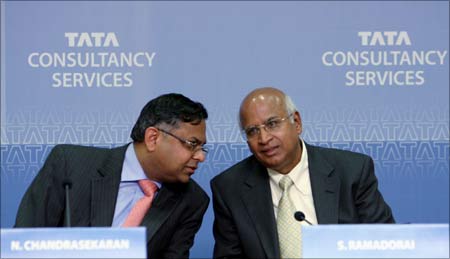 | « Back to article | Print this article |
Bill that could kill H-1B visas
Nearly two months after its introduction sparked a furore both in India and in America, the controversial Durbin-Grassley visa reform bill has again been brought before the United States Senate.
Its fate holds major ramifications for Indian individuals and Indian IT companies seeking US work visas, with some claiming that its passage could result in the decimation of the business model for Indian outsourcing firms like Wipro Technologies, Infosys Technologies and Tata Consultancy Services.
According to the Senate's web site, the bill has officially been logged as:
S. 887 - A bill to amend the Immigration and Nationality Act to reform and reduce fraud and abuse in certain visa programmes for aliens working temporarily in the United States and for other purposes.
It was introduced by US Senators Dick Durbin (Democrat-Illinois) and Charles Grassley (Republican-Iowa), and contains new stipulations that companies must follow to acquire temporary US work visas, commonly known as H-1Bs and L-1s.
The most controversial of these stipulations, the so-called '50/50' provision, would prohibit companies with more than 50 US employees from obtaining any additional work visas if more than 50% of their entire US workforce is made up of H-1B or L-1 visa holders. The provision would essentially prevent companies like Wipro and Infosys from hiring more Indian workers to work in the US.
Citing rising unemployment, Grassley claims the provision would help protect American jobs. "The original rationale [for the visa programme] was that we needed to allow importation of managers and technical people when there weren't enough Americans available. It seems to me ridiculous that companies now have more than half of their workers on [these visas] when there are certainly a lot of workers in the U.S. who can fill in some of those positions," he's reportedly said.
Opponents, on the other hand, call the bill a piece of socialist legislature and a sign of growing US protectionism. Top executives at firms like TATA and Infosys say the argument over the legislation could eventually deteriorate into a trade dispute between India and the US.
Protectionist policies now rule the day
The H-1B and L1 work visa programmes were established nearly two decades ago to allow US companies to bring workers with specialised skills into the country.
In recent years, following the emergence of Silicon Valley and the IT industry, tech-oriented professionals from India have consistently received 25 per cent or more of the United States' total allotment of H-1B visas, plus a smaller percentage of L-1 visas. And throughout the last decade, Indian companies like Infosys, Satyam Computer Services, Tata Consultancy Services and Wipro Technologies have received huge chunks of the H-1B pie.
In 2005 alone, six of the top ten companies to receive H-1Bvisas were based in India (Infosys, Wipro, TCS, Satyam, Patni Computer Systems and Larsen & Toubro Infotech), while the other four all employed significant numbers of Indians (Microsoft, Cognizant, IBM and Oracle Corporation).
The tech industry was exploding, companies said, and India produced high quality, specialised, willing talent that the industry needed. Basically, there weren't enough Americans willing or able to do the job.
And despite increasingly high quotas (once as high as 195,000 per year), H-1Bs were historically difficult to obtain, due to tough competition from Indian and Chinese workers.
But the global recession has changed things in America.
Protectionist policies now rule the day, and a new attitude has been cultivated towards H-1B holders and the companies that obtain them.
'More H-1Bs = lower pay = less Americans entering field'
Critics say that the H-1B programme discourages Americans from entering the blossoming tech industry, ultimately facilitate the off-shoring of US jobs, and is a breeding ground for immigration fraud.
They also claim that companies like Infosys and Wipro are racist in their US operations, by having almost entirely Indian origin work forces.
A recent post on popular liberal blog DailyKos, for example, says that, "Programmes like the H-1B American Worker Replacement programme have one common result: By artificially lowering the price of a commodity you discourage production. More H-1Bs = lower pay = less Americans entering field. The constant barrage of falsehoods, outdated or incorrect statistics, biased studies, propaganda and lies from the corporate lobbyists and special interests who have agendas contrary to the good of the USA and its citizens is starting to show itself for what it is, TREASON."
On top of all this, changes in policy and economic concerns have forced the big companies applying for H-1Bs to reconsider. For example, in a move widely condemned by globalisation proponents, the United States Congress has prohibited companies and banks that receive funds from the Troubled Asset Relief Program (TARP) from hiring foreign workers.
And, finally, after hearing horror stories of increasingly tough regulations to go along with a severe recession, many Indian IT professionals simply no longer aim to work in the States, and would rather forge a career here at home.
The result has been dramatic.
After years of hovering around or above 100,000, this year, the limit for H-1B visas is 65,000. Just a few years ago, that number would have been filled up in a single week. This year, eight weeks in, only 45,000 applications have been filed, leaving at least 20,000 seats empty.
The US immigration department is still actively inviting applications for H-1B visas for its 2010 quota year, which begins on 1 October 2009.
An H-1B visa costs nearly Rs 240,000
The United States Citizenship and Immigration Services handles US work visas.
And, very recently, the USCIS has begun to crack down on Indian consulting companies and other institutions obtaining H-1Bs in mass. Though stringent work visa rules have always been on the books, the USCIS is now rigorously implementing and overseeing them.
The USCIS has always mandated that H-1B applicants provide a plethora of documents, from contracts, to office details, to tax returns, to work orders and more. Now, it's made the process more wearisome and costly, with H-1Bs costing around $5,000 (nearly Rs 240,000) per person.
Another concern of new H-1B aspirants is the fate of current H-1B holders who seek to either get their visas extended or to obtain green cards. In the downturn, many have had their visa extensions rejected and their employment terminated, never mind the green card, which has become increasingly difficult to secure.
With such a huge back log of Indians seeking extensions or green cards, the process can take years.
Rather than face such anxiety, Indian workers appear to be opting for a career at home, where pay packages may not be so initially attractive, but growth and security possibilities are limitless.
Still, the US relies upon top foreign talent to prop up its impressive higher education ecosystem, particularly in fields of maths and sciences. And it's no secret that Silicon Valley imports top talent year after year.
Delays in the American visa application process have begun to hamper American universities, reports claim, and these higher education instutitions are teaming up to fight what they perceive to be unwarranted jingoism and bureaucracy.
So the US government has pledged to streamline the visa application process for qualified aspirants. John P. Holdren, director of the White House Office of Science and Technology Policy, recently unequivocally stated that it is important that America does not drive away valuable research opportunities because of any real or perceived red-tape.
'There is no way India can take it lightly'
The IT and BPO sector is critical to India's economy, as software and services together comprise about 25 per cent of the country's exports. So, naturally, Indian companies are protesting the US's recent turn towards protectionism.
"Restrictions on immigration in the US may affect our ability to compete for and provide services to clients in the US, which could hamper our growth and cause our revenue to decline," Wipro reportedly said in its annual filing to the US Securities and Exchange Commission.
Wipro's chairmain Azim Premji also allegedly predicted the Indian government would take action if the legislation passes in its current form. "There is no way our government can take it lightly. It's a vital piece of the economy," he reportedly said.
"It certainly does surprise us that the US, being so capitalist, is now going in the opposite direction. We certainly have to be watchful," Natarajan Chandrashekaran, chief operating officer of Tata Consultancy, has been quoted as saying.
Som Mittal, president of Nasscom, the industry body that represents India's software and services companies, says that while he agrees with some aspects of the bill, such as tougher oversight to prevent visa fraud, he feels the so-called '50/50' provision is imprudent and perilous. "A lot of disruption would happen. [H-1Bs] have added to the competitiveness of the US. They are extremely important to US companies seeking to lower costs," he's been quoting as saying, adding that both US and Indian industry will be negatively affected if Bill S. 887 passes in its current form.
Still, even Nasscom has been forced to soften its rhetoric, in the face of a rising protectionist sentiment in the US. Hence, the positive comments about tougher regulation, mixed in with overall displeasure.
'Critics says H-1Bs lower wages for US techies'
But it's not only Indians pleading the case for the H-1B programme. Microsoft chairman Bill Gates has passionately protested the creep of protectionism into the US tech industry, saying that importing top international talent is critical for the long-term health of Silicon Valley. Last year, he testified before the US Congress on the same, and wrote op-eds in the influential business daily Wall Street Journal to try to spread his pro-work visa message.
Critics, however, continue to say that H-1B visas lower wages for US techies, and in turn harm the economy. Frequently touted today is a two-month old report written by Prasanna Tambe of New York University's Stern School of Business and Lorin Hitt of the Wharton School at the University of Pennsylvania, which estimated that H-1B admissions at the current levels are associated with a 5% to 6% drop in wages for computer programmers and systems analysts over time.
Ultimately, if the bill were to pass in its current form, outsourcing firms would have to change their business practices in their US operations, to reduce the ratio of employees who are work visa holders to employees who are American citizens. For example, an analyst report by UBS predicts that Cognizant Technology Solutions would need to hire about 5,000 additional American employees just to meet the legislation's minimum requirement.
As unemployment rises, the bill's chances improve
How could they satisfy the '50/50' provision?
They could theoretically hire more American workers and move or create jobs overseas. The most likely move would be a combination, where recruitment of American workers increases even as some of work currently done in America is shifted off-shore.
As it stands, most major IT companies keep about 20%-30% of their staff on-shore, in the US, while between 70%-80% work off-shore in India.
A dramatic change of this ratio, to 10% versus 90%, could alter the face of the IT industry, experts say.
Finally, there is no guarantee that S. 887 will ever see the light of day in its current form. It has to go through committees and pass in the US Senate and the US House of Representatives, before getting the presidential approval. It could be modified along the way, including having the controversial '50/50' provision struck out. Also, it is likely to be considered in Congress as part of an overall effort to overhaul immigration policy. A larger package bill would likely require compromise, and would probably see the bill softened.
However, if the US unemployment rate continue to rise -- it's currently at an almost 3-decade high -- the bill's chances of passing as it stands would increase. If that happens, it could open a new, potentially dark, chapter in US-India trade relations.
